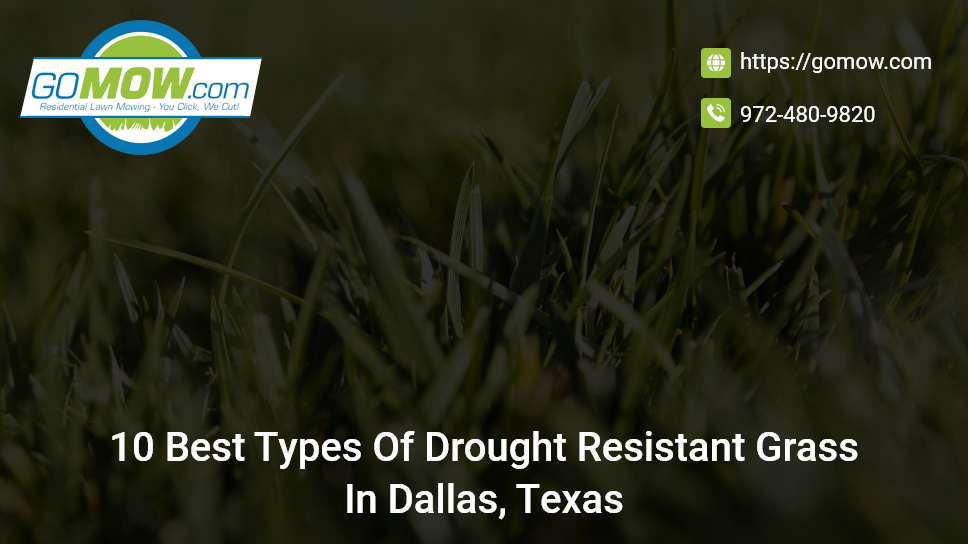What Are Drought Resistant Grass?
Drought-resistant grasses, also known as drought-tolerant grasses, are grass species that have evolved to thrive in areas with low water supply. These grasses have evolved methods to efficiently use water and tolerate long periods of drought.
Types of Drought Resistant Grass
Drought resistant grasses in Texas are of two types. There’s the Warm-season drought-resistant species and the Cool-season drought-resistant grass. Both types are durable and capable of withstanding tough drought conditions.
Warm season type
The species in this category are often found in the south where the summers are hot while winters are light. These grasses grow best in temperatures ranging between 80 to 90 degrees Fahrenheit. Even in low water conditions, warm season types will thrive. Severe temperature conditions might cause dormancy but not death.
Cool season type
Cool season species are often found in the northern United States. They thrive best during spring and fall, with preference for a temperature range between 60 and 75 degrees Fahrenheit. Cool season grass performs best in cool weather. Best drought resistant species here include Tall fescue, Ryegrass and Kentucky bluegrass.
10 Best Types of Drought Resistant Grass in Texas
Below is a list of drought resistant grass in Texas to consider for your lawn:
Warm Season Grass
These grass species are known to tolerate heat and minimal water conditions better than others in warm season climates.
-
Bermuda grass
This species is sun loving and tolerates traffic easily. Even after a drought, it responds to watering quickly. Bermuda grass needs regular mowing to be in the best shape possible. In the winter season, you might discover that your Bermuda grass has gone dormant. There are different varieties of Bermuda grass and each has its unique advantage.
-
Zoysia grass
Zoysia loves sun and shade though it’s a slow-growing grass. It’s beautiful and requires patience in most cases. Zoysia tolerates foot traffic and is generally resistant to drought. There are different variants with different capabilities.
-
Buffalo grass
This indigenous grass type is tough, durable and drought resistant. Buffalo grass will typically survive the hardest drought conditions. Mow accordingly by hiring GOMOW Lawn Care Service and you’re good to go with Buffalo grass no matter the water condition.
-
Bahia grass
Bahia is tough, disease and insect resistant and does well in tough conditions. It is sun loving and shouldn’t be planted in a shade. Consider Bahia if you’re looking at an all-purpose grass species.
-
St Augustine
Though not as disease resistant as other species, St Augustine grass is drought and heat resistant, remaining green even in cold winter months. This grass type is traffic tolerant as long as it’s not excessive. St Augustine seedlings are one of the best grass seeds in Texas.
-
Centipede grass
Centipede grass is low maintenance and drought resistant. It’s also slow-growing making it a good option when looking at a low-maintenance lawn that wouldn’t be difficult to manage by anyone. Whether the prevailing weather is sun or gloomy, centipede grass will do well. It is one of the best drought resistant grasses in Texas.
Cool Season Grass
These grass species are known to tolerate heat and minimal water conditions better than others in cool season climates.
-
Fine Fescue
This species of cool season drought-resistant grass comes in different variants. Fine fescues, such as creeping red fescue and hard fescue, are noted for their drought tolerance, making them ideal for lawns and landscaping in areas with restricted water availability. Frequent lawn mowing isn’t needed to keep Fine fescue in decent shape. Most lawns with this type of grass can do well with once weekly mowing.
-
Tall Fescue
Tall fescue is a cool-season grass recognized for its deep root structure, which allows it to tolerate dry conditions better than other grass species. It is a tough, easily-adaptable grass type that looks great on lawns. Tall Fescue is tolerant to heavy traffic but requires deep watering.
-
Wheat grass
This grass species requires little maintenance once established on a lawn yard. It’s as tough as it is rough-looking and requires minimal feed and water application to grow well. Consider wheat grass as a highly-recommended cool season drought-resistant grass in Texas.
-
Kentucky Bluegrass
Some Kentucky bluegrass cultivars are drought tolerant once established, however they may require more water than other drought-resistant grasses. Kentucky Bluegrass remains the ideal drought resistant grass in Texas when considering cool season types.
Drought-resistant grasses are an effective way to conserve water and preserve green landscapes in water-stressed areas. Buffalograss, Bermudagrass, fescue, zoysiagrass, tall fescue, and bluegrass are all drought-tolerant, making them great assets in sustainable landscaping and agriculture.
By selecting the right grass species and applying effective yard care techniques, we can save water, protect the environment, and ensure the longevity of vegetation even in drought-stricken locations.
For all mowing concerns, GOMOW Lawn Care Service provides a quality lawn mowing experience designed to keep your lawn well-groomed and lovely all year long.
Learn more about our lawn mowing service here – https://gomow.com/
